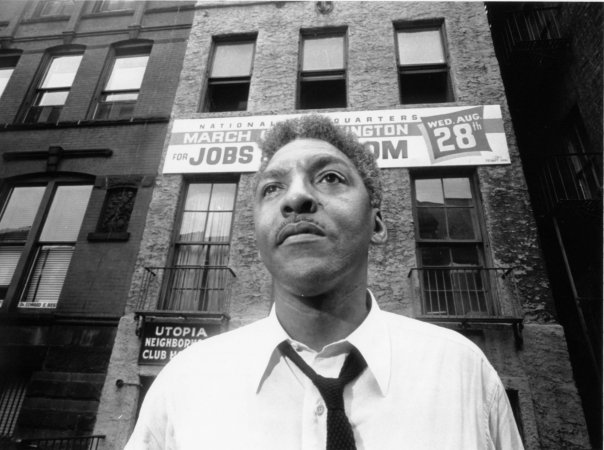Growing up in Virginia, my momma used to say to me that I sometimes “run around like a chicken with its head off.” That’s as perfect a depiction of any of my chaotic life as the month of June slips away. Duly noted.
You see, amid traveling, speaking engagements, fawning over a newborn grandson, greeting guests in my wife’s restaurant (and sometimes, yes, getting on her last nerve) and yard work, I failed to write something pertaining to Gay Pride Month. I really wanted to but never got around to it.
So while being confronted with the dual realities of the month coming to an end and the unrelated surge in hate mongering spilling into violence against LGBTQQI people, I decided to “go high.”
This was the sage advice of former First Lady Michelle Obama’s “when they go low, we go high.” Thus, with this narrative, we’ll “go high” and bring a true champion of civil and gay rights into the mainstream and off the periphery of American history. Here we cast our focus on the woefully unrecognized and unappreciated Bayard Rustin!
In a nutshell, Bayard was a Black leader in social movements for civil rights, socialism, non-violence, and gay rights. Rustin died in 1987. He worked on the March on Washington movement in 1961 and later organized Freedom Rides, assisted in organizing the Southern Christian Leadership Conference to strengthen Martin Luther King, Jr.’s leadership while teaching King about non-violence.
Rustin served the trade union as a theorist, tactician, and organizer. He conceived the coalition of liberal labor and religious leaders who supported passage of the civil rights and anti-poverty legislation of the 1960s. As the first Executive Director of the AFL-CIO’s A. Philip Randolph Institute, he worked closely with the labor movement to ensure African American workers’ rightful place in the House of Labor.
Bayard also assisted in organizing the first of the Freedom Rides in 1947. The Freedom Rides tested a Supreme Court ruling banning discrimination in interstate travel and was a key organizer of the March on Washington in 1963.
In 1964, Rustin organized one of the largest Civil Rights demonstrations ever held. It had more than 400,000 people in New York boycotting public schools to protest their defacto segregation.
While Rustin was a driving force for equality, it did not come welcomed with open arms. The most outrageous instance came in in 1953.
Now let this sink in; he was sentenced to 60 days in jail for being openly gay. Unfortunately, due to criticism over his sexuality, Bayard often acted as a “behind the scenes” influential advisor to civil rights leaders. It wasn’t until the 1980s that he became a public advocate on behalf of gay causes. He spoke at events as an activist and supporter of human rights.
In 1960, Rustin hit a low in his career thanks to another Black leader, Rep. Adam Clayton Powell, Jr of New York. Powell became angry with Rustin and Dr. King when he discovered they were planning a march in Los Angeles outside of the Democratic National Convention. He met with King to discuss his frustrations and carried it further by threatening to spread an innuendo that Rustin and King were gay lovers. He threatened this if they did not stop working together. King inevitably called off the march and followed Powell’s request to distance himself from Rustin.
But the attacks didn’t stop there.
Strom Thurmond, the segregationist Senator from South Carolina, verbally attacked Rustin on the floor of the U.S. Senate. He labeled Rustin a sexual pervert to discredit the March on Washington where Rustin was chief organizer. However, Thurmond’s attack backfired. The leaders of the civil rights movement publicly expressed their “complete confidence” in Rustin’s character.
Now to be clear, Bayard Rustin was never ashamed of his sexual orientation. Davis Platt, Bayard’s partner from the 1940s stated, “I never had any sense at all that Bayard felt any shame or guilt about his homosexuality. That was rare in those days. Rare.”
As further evidence of his compassion for others, the plight of Jews in the Soviet Union reminded Rustin of the struggles that Blacks faced in the United States. After seeing the injustices that Soviet Jews faced, Rustin became a leading voice in advocating for the movement of Jews from the Soviet Union to Israel. In 1966, he chaired the historic Ad Hoc Commission on Rights of Soviet Jews organized by the Conference on the Status of Soviet Jews. He led a panel of jurors in the Commission’s public tribunal on Jewish life in the Soviet Union.
President Reagan issued a statement on Rustin’s death, praising his work for civil rights and “for human rights throughout the world”. He added that Rustin “was denounced by former friends because he never gave up his conviction that minorities in America could and would succeed based on their individual merit”.
Though former President Barack Obama posthumously awarded Rustin the Presidential Medal of Freedom in 2013, Rustin remains much less known when compared to his civil rights movement peers. Some argue this is due to the homophobia of the time.
I’ll end with a Rustin quote that has withstood the test of time: “Bigotry’s birthplace is the sinister back room of the mind where plots and schemes are hatched for the persecution and oppression of other human beings.”
Thanks Bayard Rustin. You’re no longer on the sidelines of history. And because of you, neither are other LGBTQQI Americans.
Period!
- Again, cutting off one’s nose to spite one’s face – by Terry Howard - April 7, 2024
- Black college athletes: Listen to the NAACP – by Terry Howard - March 31, 2024
- Governor “King on Steroids” Mark Robinson – by Terry Howard - March 11, 2024

